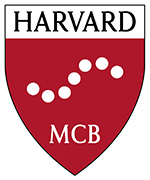After nearly five years teaching undergraduates as a preceptor, Monique Brewster (MCO Ph.D. ‘17) has been appointed Associate Concentration Advisor of MCB and CPB. Her new role’s responsibilities include guiding undergraduates through the process of declaring, offering advice to current concentrators, working in parallel with Assistant Director of Undergraduate Studies Dominic Mao and Program Coordinator Irina Cashen. Brewster will also continue teaching LS 1A and MCB65 as a lecturer.
“I’m happy to join the team,” Brewster says. “And I’m excited to see some of the students that I met in LS1A as they join the MCB and CPB concentrations.”
Brewster is a familiar face to many undergraduates. She was a preceptor for LS 1A, an introductory life sciences course that enrolls over 250 students each year, and MCB65 Physical Biochemistry: Understanding Macromolecular Machines, a much-smaller spring course.
As a preceptor—which is a teaching position unique to Harvard—Brewster worked closely with professors to develop course materials, teach and support students, and manage the courses’ staff of teaching fellows and facilitators.
“For me, the role of [a teacher] isn’t just to pass information to the students; it’s really to inspire them to engage with the material and continue learning outside of the classroom,” Brewster says.“I consider myself successful if I can encourage students to go out and learn on their own.”
This presented a unique challenge when the COVID-19 crisis forced classes to migrate online. Preceptors and course instructors spent much of 2020 reworking syllabi, creating videos, and developing interactive lectures, sections, and laboratory activities suitable for online classes. This work was supported by the Bok Center for Teaching and Learning and guided by educational research-supported best practices for teaching. “It was definitely an interesting experience making sure our instructors and teaching fellows learned to use the new suite of tools and were prepared to teach online…we are all very proud of how the courses ran,” Brewster says.
Biology has been a lifelong interest for Brewster, but her passion for teaching is relatively new.
Growing up in a small town called Saugerties in upstate New York, Brewster was always curious about how things worked. “I distinctly remember learning how to read on Magic School Bus books that would take you on a tour of the inside of a human body,” Brewster says. “As I got older, I learned more about how the miniscule aspects of biology work, the chemistry and the biology that happens in the cell,and I just became more and more fascinated.”
However, her appreciation for chemistry didn’t gel until her sophomore year at MIT. “Once I…earned that many of the complicated reactions that I was sketching as Organic Chemistry syntheses could happen inside a cell at 37 Celsius and in 55M water, I was mind-blown,” she recalls.
When Brewster applied to graduate programs during her senior year at MIT, the tight-knit community in MCB and the MCO program appealed, as did the structural biology research taking place in the Gaudet Lab.
Like many MCO graduate students, Brewster became a teaching fellow for LS 1A in her second year. “To my surprise, even though I don’t enjoy public speaking, I really, really loved teaching,” Brewster says. “I just like seeing a lightbulb go off in students’ heads as they connect concepts that they’re learning in different places and apply it to understanding the world around them.”
Brewster especially enjoys teaching LS 1A because its multidisciplinary curriculum highlights the connections between chemistry and molecular biology in a way that’s accessible for students just starting their collegiate careers.“Very rarely will you ever see a scientific problem that’s strictly physics or just chemistry or just biology,” Brewster says. “The most exciting bits are where they merge, where they mix, where they intersect.”
She has been working with the LS 1A team as a preceptor for five back-to-back fall semesters alongside MCB faculty Richard Losick, CCB and MCB faculty Daniel Kahne, MCB faculty Rachelle Gaudet, and the late Rob Lue.
Connections between biochemistry and everyday experience also motivated Brewster’s Ph.D. research. Her thesis investigated the structures and biochemistry of two receptor ion channels: TRPV1, which allows us to sense noxious heat and the spiciness of peppers, and TRPA1, which responds to extreme cold and chemicals in wasabi. Both TRPV1 and TRPA1 turn up in pain neurons and are responsible for the painful aftereffects of intense spices and other stimuli.
Outside of her work, Brewster is a musician. She sings and plays Sabar, a type of Senegalese drum, as well as the flute. Attending live concerts around the Boston area is one of her favorite pastimes.
Overall, she’s glad to be part of the MCB community and looking forward to helping undergraduates navigate their scientific education. “It’s a whirlwind for all of us,” she says. “We all are committed to supporting students in every way possible, despite the nonideal circumstances.”
by Diana Crow




